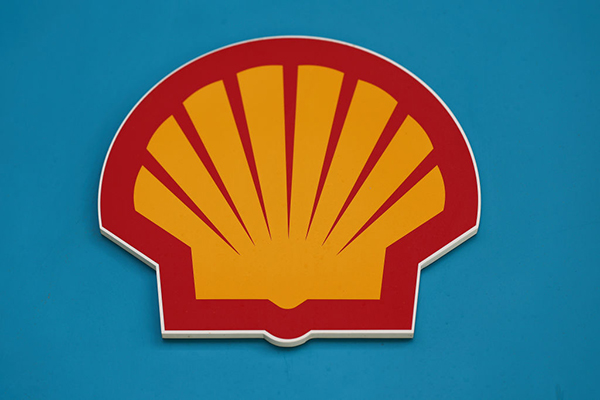Why Shell shares have just been downgraded
With its rating cut and profit forecasts reduced, Graeme Evans explains why this City analyst has turned negative on the popular oil major.
26th November 2025 13:11
by Graeme Evans from interactive investor

The Shell logo on a wall in Houston, Texas. Photo: Aaron M. Sprecher/Getty Images.
Shell shares no longer screen as cheap, a City bank declared today as it removed its Buy stance in the wake of a 12% advance by the top-performing energy major.
UBS said the medium-term challenges associated with resource replenishment and more limited top-line growth were becoming harder to justify at the current valuation.
- Invest with ii: Top UK Shares | How to Start Trading Stocks | Open a Trading Account
It also sees downside risk to Shell (LSE:SHEL)’s buyback programme, which it assumes will be scaled back from a quarterly rate of $3.5 billion (£2.7 billion) to $3 billion in February’s annual results.
Share repurchases currently make up 62% of the group’s shareholder distributions, with Shell on track to have reduced its 2025 share count by 29% versus 2021 levels.
The support of buybacks and improving sentiment in the wider energy sector have lifted Shell’s shares to 2,772p, or an enterprise value of 6.1 times its debt-adjusted cash flow (DACF). This compares with 5.1 times at the start of the year, when shares were 2,478p.
In this week’s note, UBS cut its 2026-28 earnings per share estimate by 4% to reflect its expectations for a slower buyback plan and cut to chemicals division estimates.
The outcome is a 6% reduction of its price target to 3,000p, which is based on a 50-50 blend comprising a sum-of-the-parts valuation at $75 a barrel and a DACF multiple of six times.
- Sector Screener: two FTSE 100 property stocks with upside potential
- Uranium: industry dynamics investors should know
UBS now has a Neutral recommendation, stressing that Shell’s strong financial footing and hard-to-replicate businesses still gave it an important role in any energy portfolio.
It points out that Shell is the least sensitive to oil prices and well positioned in a downturn.
The company boasts the industry’s lowest dividend breakeven point at $43 a barrel, a level that excludes the impact of disposals or working capital. It also has the strongest balance sheet, with the ratio of net debt to market capitalisation at 21%.
This year’s re-rating of shares has also reflected Shell’s track record on financial performance, having beaten estimates on cash flow from operations for seven quarters in a row and by an average 10%. This year’s 5% reduction in share count has also helped.
UBS also highlights the improving industry sentiment over the longer-term need for oil and gas, noting that the International Energy Agency’s (IEA) current policies scenario in its World Energy Outlook shows oil demand growing up to 2050.
The wider sector has also experienced a re-rating, helped by greater optimism for the outlook of refining margins and recent signalling from leading OPEC members that they intend to pause production increases in early 2026.
- Nvidia: should you buy or sell poster child of the AI trade?
- Sign up to our free newsletter for investment ideas, latest news and award-winning analysis
UBS said in its report that it still sees an important role for share buybacks at Shell going forward, given the financial benefits they create from a lower share count.
However, it added: “Too great of an emphasis on buybacks, especially at higher relative multiples, can give an impression a company has no better options with which to invest their money.
“Over time, we expect the market to provide a greater benefit to those able to more quickly rebalance distributions towards dividends, which in turn we see as a function of the quality of their investments.”
For several years, the energy sector has been valued on its ability to distribute cash to shareholders, but with the market starting to reassess the timing of peak oil UBS thinks more time should now be spent scrutinising spending plans.
Its analysis shows a large variance between European Big Oil companies, with Shell and BP (LSE:BP.) shown to be allocating less in percentage terms towards growth than peers including Equinor ASA ADR (NYSE:EQNR).
Highlighting a production gap that Shell will need to fill by 2035, UBS said the door was open to more M&A: “In terms of the geographical focus, we think it’s likely for Shell to focus on its core countries including the so-called Deepwater Golden Triangle of the US Gulf of Mexico, West Africa and Brazil.”
These articles are provided for information purposes only. Occasionally, an opinion about whether to buy or sell a specific investment may be provided by third parties. The content is not intended to be a personal recommendation to buy or sell any financial instrument or product, or to adopt any investment strategy as it is not provided based on an assessment of your investing knowledge and experience, your financial situation or your investment objectives. The value of your investments, and the income derived from them, may go down as well as up. You may not get back all the money that you invest. The investments referred to in this article may not be suitable for all investors, and if in doubt, an investor should seek advice from a qualified investment adviser.
Full performance can be found on the company or index summary page on the interactive investor website. Simply click on the company's or index name highlighted in the article.